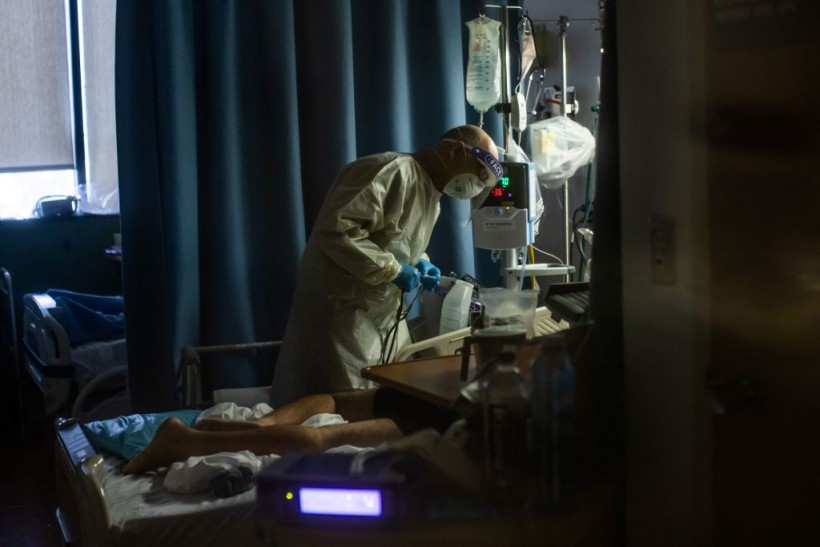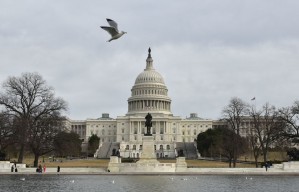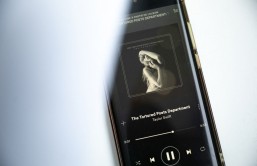
(Photo : APU GOMES/AFP via Getty Images)
TOPSHOT - Doctor Delkhah Shahin checks on a 34 year old, unvaccinated Covid-19 patient at Providence Cedars-Sinai Tarzana Medical Center in Tarzana, California on September 2, 2021. - According to Dr. Yadegar at the hospital, the number of covid patients are significantly less than they were in winter, but from a psychological standpoint it's much more difficult because most of the patients in the ICU on respirators are unvaccinated, younger and healthier 30 and 40 year olds without comorbidities. Vaccinated patients at the hospital are typically older, but the Covid-19 effects are much milder compared to the unvaccinated patients that have more severe symptoms.
COVID-19 continues its onslaught on the world. With its new variant Omicron, numbers spike on record-breaking levels. On average, almost 2 million individuals got infected by the dreaded in the past seven days.
However, some medical experts see the mild yet highly contagious Omicron variant as a light at the end of this dark, long tunnel of the pandemic, as per Gulf News.
2022: The Beginning Of The End
An expert from the World Health Organization (WHO) believes that the pandemic will begin its end soon as the world has already developed the means to prevent severe infections and even death. This is through vaccines, medications, masks, tests, and even non-medical strategies.
Dr. Maria Van Kerkhove, WHO Technical Lead, said the world could end the virus this year because the world has developed tools to prevent deaths due to COVID-19.
Nonetheless, it is expected that there will still be large numbers of people who will get infected in the coming days or months, but most of them will be able to recover faster. However, there is still a possibility of fatalities due to many factors like access to quality healthcare services, according to NBC News.
For Filipino-American molecular biologist and MIT-trained vaccine researcher Fr. Nicanor Austriaco, the high transmissibility of Omicron indicates that the pandemic is coming to its end. He said that Omicron would eventually serve as a "natural vaccine" that will try to spread to everyone rapidly.
"And when it runs out of food, it will begin to crash," Fr. Austriaco explained. They pointed out the situations in South Africa, wherein Omicron first emerged, the numbers are "crashing."
"Once it spreads like wildfire, and when all the trees are burned, there's nowhere for it to go. So it begins to crash," he said.
Though he expects fewer hospitalizations and deaths, he still advised the public to stay cautious, especially the unvaccinated ones.
COVID-19 Is Here To Stay
On the other hand, Dr. Timothy Brewer, professor of epidemiology at the David Geffen School of Medicine at UCLA, advises the public to learn to live with the virus as it is not going to go away for good.
He explained that COVID-19 would be staying for a long time because it has become "well-adapted" for transmission between humans.
However, Dr. Brewer sees that science will develop vaccinations, medications, and treatments that will keep COVID-19 outbreaks less severe in the coming years. Similar to what happened to influenza.
Meanwhile, Dr. Ashish K Jha, Dean of the Brown University School of Public Health, warns the public about "a very large wave of infections" in the coming weeks, though cases will fall at a fast rate probably by the end of February.
He also underscores the importance of getting boosters and being fully vaccinated for protection against severe conditions, in line with the FDA, as per Fox News via MSN.
With this, experts are also pushing to boost the production and distribution of COVID-19 vaccines, which effectively protect against the dreaded virus. Unfortunately, according to WHO, there are places globally that have low vaccination turnout, such as Africa, where only 8% of its population are fully vaccinated.
Related Article: Return Of Remote Classes Drives US Families Frustrated








